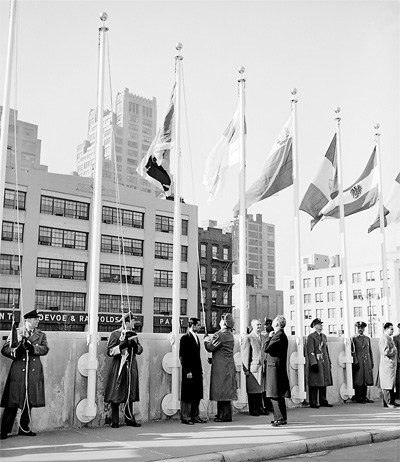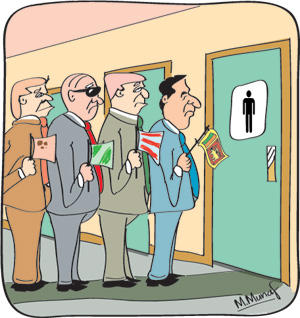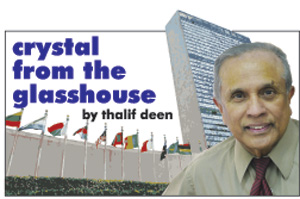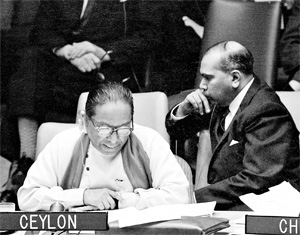Sunday Times 2
When JR threatened to pull out of the UN

The lion flag was ceremoniously unfurled in the UN precincts following our admission as a UN member state back in December 1955.
UNITED NATIONS – When the UN General Assembly adopted a resolution by an overwhelming majority implicitly critical of Britain-and urging the British government to negotiate its long-simmering territorial dispute with Argentina over ownership of Falkland Islands – Sri Lanka was one of 12 countries currying favour with the UK and voting against the resolution back in November 1982.
Besides Sri Lanka, “the gang of 12″ — as they were dubbed — included Britain, New Zealand, Antigua and Barbuda, Belize, Fiji, the Dominican Republic, Malawi, Papua New Guinea, Solomon Islands, Gambia and Oman (mostly countries with little or no political clout at the UN)
As a gesture of goodwill to the Brits for their generous aid to an ongoing development project in Sri Lanka, President J.R. Jayewardene (JRJ) reciprocated with gratitude — instructing Foreign Minister A.C.S. Hameed in New York to vote against the resolution. Not surprisingly, the Brits were happy but the Argentines were livid.
The political payback came five years later when Argentina played a key role in a resolution before the then-Human Rights Commission in Geneva in 1987 which singled out Sri Lanka for human rights violations. JRJ apparently was furious. A Sri Lanka delegation, led by JRJ’s brother Harry Jayewardene, a distinguished lawyer, was trying to kill or water down the resolution.
With the delegation holed up in the Sri Lanka mission in Geneva working out their strategy, Harry was keeping JRJ briefed about the negotiations. As a senior diplomat would explain later, one of the many phone conversations between the two brothers wasn’t going too well.
Harry was addressing JRJ by his nickname Dicky – a shortened version of Richard (as in Junius Richard Jayewardene). “Yes, Dicky, Yes Dicky, ” the brother was heard telling JRJ on a long distance phone call to Colombo. And then came the bombshell overheard by the delegates: “No, Dicky, you can’t do that.”
 As JRJ hung up, Harry turned to the Sri Lankan delegates and said: “He wants us to get out of the UN.” If JRJ’s instructions had been taken seriously, Sri Lanka would not have celebrated its 60th anniversary in the world body, come December 15. Still JRJ fell short of living up to a modified Groucho Marx dictum: I will not continue in any Organization which will have me as one of its members.
As JRJ hung up, Harry turned to the Sri Lankan delegates and said: “He wants us to get out of the UN.” If JRJ’s instructions had been taken seriously, Sri Lanka would not have celebrated its 60th anniversary in the world body, come December 15. Still JRJ fell short of living up to a modified Groucho Marx dictum: I will not continue in any Organization which will have me as one of its members.
Although JRJ was present at the founding of the United Nations in San Francisco in 1945, he was the only Sri Lankan head of government who never addressed the General Assembly — and scrupulously kept away from the UN building even when he was in New York enroute to Washington DC on a state visit in 1984. He did not even pay a courtesy call on the Secretary-General – as heads of state routinely do while visiting New York.
JR, for some unaccountable reason, shied away from the UN, perhaps convinced that the world body was irrelevant or failed to justify its existence. Ernest Corea, a former Sri Lankan High Commissioner to Canada and ex-Ambassador to the United States, both under the JR regime, told the Sunday Times JR was initially very supportive of the UN as potentially a catalyst of global harmony.
He grew disappointed, however, as he felt it had developed into an ineffective talk-shop. Nevertheless, JR was always supportive of the UN’s specialised agencies, said Corea, who was also a former editor of the Ceylon Daily News and the first Sri Lankan journalist to cover the General Assembly sessions.
When Sri Lanka chaired the Non-Aligned Movement (NAM) in the late 1970s, JRJ offered one of the more cynical definitions of “non-alignment.” In an interview with a visiting New York Times reporter, he said the only two genuinely “non-aligned” countries in the world were the US and the Soviet Union.
All others, he pointed out, were aligned either to one or the other of the two superpowers at the height of the Cold War.
Meanwhile, at the UN, a country’s political affiliation is best reflected at voting time. And when a politically-sensitive issue is up for vote, you have one of three choices: vote “yes”, vote “no” or abstain.
But some countries, who want to play it safe and avoid offending Western donors or friendly neighbours, take the fourth option: unceremoniously fleeing from their seats pretending they are rushing to the toilet. Sri Lanka is no exception. And being absent from your seat is called the “toilet factor in UN voting.”
Ambassador Paolo Fulci, a former Permanent Representative of Italy to the UN, once jokingly told a group of reporters the only way to resolve this problem is to have portable toilets in the margins of committee rooms and the cavernous General Assembly hall-perhaps forcing delegates to cast their votes while contemplating on their toilet seats.
 As a general rule, Sri Lanka has traditionally voted collectively with NAM and the Group of 77 – two coalitions representing either the political or the economic interests of developing countries. During the height of the Cold War – and when Sri Lanka played a key role in NAM – a piece of advice given by the foreign ministry to delegates was hilariously simple. “If you are forced to vote on an eleventh-hour unexpected resolution — and do not have instructions from Colombo – make sure to look to your left how India votes, and then look to the right how Yugoslavia votes — and if both ambassadors are seen rushing to the toilet, follow them to the toilet.”
As a general rule, Sri Lanka has traditionally voted collectively with NAM and the Group of 77 – two coalitions representing either the political or the economic interests of developing countries. During the height of the Cold War – and when Sri Lanka played a key role in NAM – a piece of advice given by the foreign ministry to delegates was hilariously simple. “If you are forced to vote on an eleventh-hour unexpected resolution — and do not have instructions from Colombo – make sure to look to your left how India votes, and then look to the right how Yugoslavia votes — and if both ambassadors are seen rushing to the toilet, follow them to the toilet.”
Sri Lanka’s voting also came under a spotlight in the aftermath of the 1956 Soviet military intervention in Hungary. The nation-wide revolt and the suppression of the revolt by the then Soviet Union and its Warsaw Pact partners came up for a vote at the United Nations. But the request for voting instructions apparently arrived when the foreign ministry in Colombo was fast asleep.
Ernest Corea recounts Prime Minister S.W.R.D. Bandaranaike’s visit to the UN immediately following the Asian Prime Minister’s Conference in New Delhi.
Asked why Ceylon (the name change to Sri Lanka took place in 1972) abstained on a key resolution on Hungary, SWRD famously responded: “We are rather respectable people in Colombo. We go to bed fairly early, and we remain there till morning.”
And that sounded reasonable by foreign ministry standards – and a plausible face-saving measure (neither antagonizing the West nor the Soviets).
Since the days of Ambassador Shirley Amerasinghe – who first chaired a UN committee created by the General Assembly in December 1968 to investigate Israeli human rights abuses in occupied Palestinian territories — Sri Lanka has consistently voted against Israel while advocating the cause of the Palestinians.
But on one occasion – probably from instructions from the foreign ministry – the Sri Lankan delegate apparently bolted from his seat when the vote on Palestine was taken in December 2006. The Sunday Times ran that story with a classic headline: “Flushing Palestinian cause down the toilet.”

Professor G.P. Mallalasekera (1961), perhaps the only Sri Lankan Ambassador in a bygone era to address the UN in a national dress. He was the third Permanent Representative following Sir Senerat Gunewardene (1956 and later in 1963) and Sir Claude Corea (1958).
In our early days at the United Nations, there was a longstanding anecdote about how one could predictably guess the nationality of a diplomat judging by how he reacts when introduced to an attractive woman at a diplomatic reception.
The British delegate will be exceptionally formal asking her what her area of specialization is, what committee she is covering and how long she has been in her country’s foreign service.
The French delegate will gracefully bow and offer to kiss her hand proving that chivalry is not dead. The American delegate will cut to the chase – and ask her for a date. But when the Sri Lankan delegate is introduced to a woman – so the story goes – he will rush to his office and telex the Foreign Ministry for instructions.
(Thalif Deen is the UN Bureau Chief and Regional Director, Inter Press Service (IPS) news agency)

